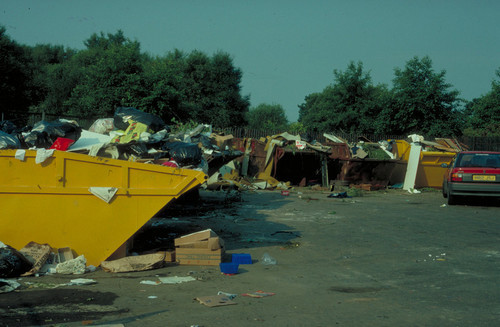Receiving waste or sewage
 If your business receives waste or sewage (wastewater), including if this is hazardous waste / special waste, you will need to put in place pre-acceptance and acceptance procedures. These procedures allow you to check the suitability of the waste you receive. You can only receive specific waste types if you are authorised to do so in your Pollution Prevention and Control (PPC) permit or waste management licence (WML).
If your business receives waste or sewage (wastewater), including if this is hazardous waste / special waste, you will need to put in place pre-acceptance and acceptance procedures. These procedures allow you to check the suitability of the waste you receive. You can only receive specific waste types if you are authorised to do so in your Pollution Prevention and Control (PPC) permit or waste management licence (WML).
If you do not know the nature or composition of the waste you receive there is the risk that it could react with other waste or lead to pollution incidents through uncontrolled emissions. Acceptance procedures are also important to prevent that.
Special requirements apply to hazardous waste / special waste. If you receive hazardous waste / special waste you should also see our guidance on receiving hazardous waste or receiving special waste.
What you must do
Comply with your permit, licence or registered exemption
If your business has a permit, licence or registered exemption you must comply with its conditions, including any conditions about receiving waste or sewage.
Does your waste or sewage business need a permit, licence or exemption?
You must comply with Duty of Care when you receive waste or sewage.
Duty of Care - Your waste responsibilities
Put in place pre-acceptance procedures
Before you agree to accept any waste or sewage:
- find out the contact details of the original producer
- find out the nature of the process that produced the waste or sewage
- obtain a full description of the waste or sewage including:
- its chemical composition
- the quantity
- the form of the waste, eg solid, liquid, sludge
- any hazards associated with the waste
- in some cases you may want to ask the waste producer for an analysis of the waste from a suitably qualified third party or obtain a representative sample of the waste and compare it with the written description - for example, if the waste is hazardous or a new waste stream for your site
- identify a suitable treatment method or disposal route for the waste with a full costing.
Put in place acceptance procedures
If you agree to accept waste:
- use a booking system to make sure that you are ready to receive the waste
- check and complete all necessary paperwork, such as waste transfer notes or consignment notes for hazardous/special waste
- inspect the load to check:
- the description of the waste
- the quantity of the waste
- all containers are clearly labelled and secure
- test samples to confirm the characteristics of the waste
- have adequate infrastructure to safely unload the waste, such as a bunded sampling/reception area
- do not use any damaged hoses or connections to unload waste
- store the waste correctly.
The waste producer must provide information about the waste in the waste transfer note or consignment note, including the European Waste Catalogue (EWC) code. This is sometimes called the lists of waste code.
- Waste Thesaurus: SEPA guidance for coding waste - an alphabetical list of waste types with their corresponding EWC codes.
- Consolidated version of the European Waste Catalogue (Adobe PDF - 162KB)
You should carefully check all of the information you receive. If a number of parties have handled the waste before you receive it, you should check the information with the original waste producer.
Keep records and complete waste returns
You must use a waste management tracking system to record details of all waste enquiries you receive.
Give every waste enquiry a unique reference number and record all actions you take with the waste against this reference number, for example:
- pre-acceptance information
- acceptance information or reasons for rejecting the waste
- how the waste is stored
- how the waste is treated, recovered or disposed of
- how the waste is removed from the site, eg details of where it has been taken.
You must comply with the conditions in your PPC permit or waste management licence (WML), including any condition to send a waste return to your environmental regulator.
Your waste return must include information about the waste you receive at your site, such as the origin of the waste, the amount of waste, the EWC code, and whether you sent the waste to another site.
In Northern Ireland, you can complete your waste return using the relevant form on the Northern Ireland Environment Agency's (NIEA) website. NIEA: Waste forms
In Scotland, you can complete your waste return using the relevant form on SEPA's website. SEPA: Licence permitted site data returns
There are special requirements for receiving hazardous waste or receiving special waste.
